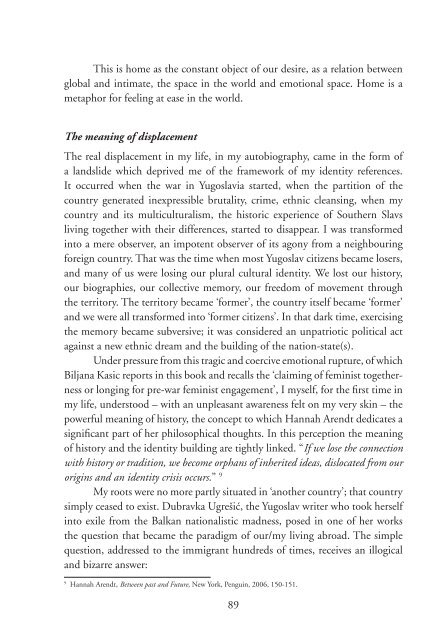Teaching Subjectivity. Travelling Selves for Feminist ... - MailChimp
Teaching Subjectivity. Travelling Selves for Feminist ... - MailChimp
Teaching Subjectivity. Travelling Selves for Feminist ... - MailChimp
Create successful ePaper yourself
Turn your PDF publications into a flip-book with our unique Google optimized e-Paper software.
This is home as the constant object of our desire, as a relation between<br />
global and intimate, the space in the world and emotional space. Home is a<br />
metaphor <strong>for</strong> feeling at ease in the world.<br />
The meaning of displacement<br />
The real displacement in my life, in my autobiography, came in the <strong>for</strong>m of<br />
a landslide which deprived me of the framework of my identity references.<br />
It occurred when the war in Yugoslavia started, when the partition of the<br />
country generated inexpressible brutality, crime, ethnic cleansing, when my<br />
country and its multiculturalism, the historic experience of Southern Slavs<br />
living together with their differences, started to disappear. I was trans<strong>for</strong>med<br />
into a mere observer, an impotent observer of its agony from a neighbouring<br />
<strong>for</strong>eign country. That was the time when most Yugoslav citizens became losers,<br />
and many of us were losing our plural cultural identity. We lost our history,<br />
our biographies, our collective memory, our freedom of movement through<br />
the territory. The territory became ‘<strong>for</strong>mer’, the country itself became ‘<strong>for</strong>mer’<br />
and we were all trans<strong>for</strong>med into ‘<strong>for</strong>mer citizens’. In that dark time, exercising<br />
the memory became subversive; it was considered an unpatriotic political act<br />
against a new ethnic dream and the building of the nation-state(s).<br />
Under pressure from this tragic and coercive emotional rupture, of which<br />
Biljana Kasic reports in this book and recalls the ‘claiming of feminist togetherness<br />
or longing <strong>for</strong> pre-war feminist engagement’, I myself, <strong>for</strong> the first time in<br />
my life, understood – with an unpleasant awareness felt on my very skin – the<br />
powerful meaning of history, the concept to which Hannah Arendt dedicates a<br />
significant part of her philosophical thoughts. In this perception the meaning<br />
of history and the identity building are tightly linked. “If we lose the connection<br />
with history or tradition, we become orphans of inherited ideas, dislocated from our<br />
origins and an identity crisis occurs.” 9<br />
My roots were no more partly situated in ‘another country’; that country<br />
simply ceased to exist. Dubravka Ugrešić, the Yugoslav writer who took herself<br />
into exile from the Balkan nationalistic madness, posed in one of her works<br />
the question that became the paradigm of our/my living abroad. The simple<br />
question, addressed to the immigrant hundreds of times, receives an illogical<br />
and bizarre answer:<br />
9<br />
Hannah Arendt, Between past and Future, New York, Penguin, 2006, 150-151.<br />
89

















